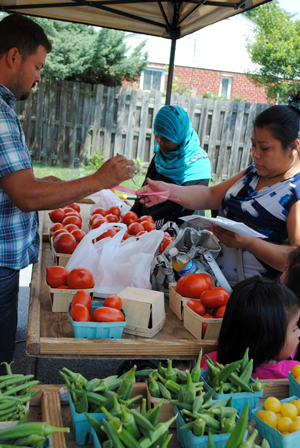This week I’ve joined a number of food system leaders at the New York Times Food For Tomorrow conference, where the role of public policy in the food system has been a recurrent topic. Public policy is about directing public resources to support the public interest. It is for this reason that this weekend I joined Mark Bittman, Michael Pollan and Olivier De Schutter in calling for a better way for this nation to manage its food and agriculture system.
The question is not whether to establish national policies to shape the contours of the food system. The question is what food system we want. This nation already invests $100 billion tax dollars annually to support production, insurance and marketing of grain and oil crops, and to fund the Supplemental Nutrition Assistance Program—a program that testifies to this nation’s failure to prevent hunger.

Buying produce at the Crossroads Farmers Market in Takoma Park, MD. A national food, health and wellbeing policy could help make healthy foods like these available and affordable for all Americans.
As Mark Bittman incisively noted at this conference, the problem of hunger is not one of food production, but of economic inequality and lack of democracy. That is, a number of policies such as trade liberalization, regressive taxation and outdated minimum wage laws result in displacement of people, labor exploitation and poverty, the latter of which is the root cause of hunger in advanced economies. It is beyond irony, and should be a national shame, that the nation that sloganeers about “feeding the world” cannot prevent hunger—1 of every 6 Americans is food insecure—and instead expends billions in “social safety net programs.” This is wasteful of both human and financial capital. We need more coherent policies.
In the simplest terms, our public policies should support the public good—such as creating jobs and healthful food—and not subsidize the bad: environmental degradation, chronic disease and hunger. Instead of expending tax dollars to support production of commodities that undergird the junk food diet, we should use public resources to support farmers who produce food in accordance with the official dietary recommendations of the Institute of Medicine and Department of Agriculture (USDA.) These call for a primarily plant-based diet. It only stands to reason that we should invest in regional market infrastructure and in support of farmers who produce the healthy fruits and vegetables that science recommends we eat for long, healthful and productive lives. UCS economic analysis demonstrates that this would require $90 million tax dollars annually—compared with the current $5 billion annual subsidies of commodity crops—and would result in net gain of 189,000 new jobs in local food systems and $9.5 billion in economic activity due to sales of healthy food. In fact, our economic analysis further demonstrates that if Americans did nothing more radical than eat the daily portions of fruits and vegetables recommended by the USDA, 127,000 lives and $17 billion dollars could be saved.
At present, people who wish to eat better are stymied. The freshest, most healthful, least processed food is more expensive than the ubiquitous, highly processed and heavily advertised food, which is not a market result. The myriad policies governing disparate parts of our agricultural and food systems require coordination and integration for the greatest effectiveness and fiscal responsibility possible. For this reason, we have called for a National Policy for Food, Health and Wellbeing.
Our government expends billions of dollars to prop up our agricultural and food system. Shouldn’t we do this in a way that preserves the environment, produces healthful food, and provides the broadest economic opportunity for farmers and workers? Join Mark Bittman, Michael Pollan, Olivier De Schutter and me in calling upon President Obama to issue an executive order to establish a National Policy for Food, Health and Wellbeing by taking action here.
